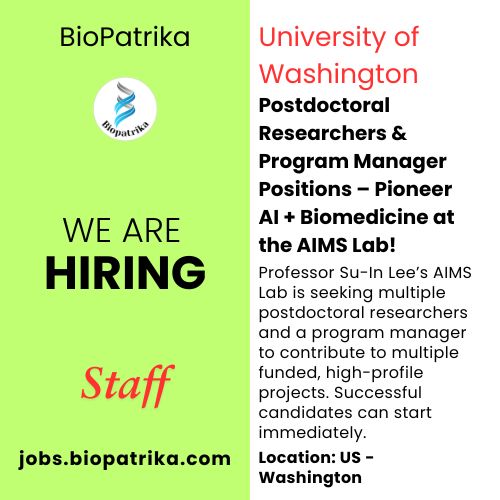Postdoctoral Researchers & Program Manager Positions – Pioneer AI + Biomedicine at the AIMS Lab!
Job Overview
-
Date PostedSeptember 10, 2025
-
Location
-
Expiration dateOctober 10, 2025
-
Click to apply:
Job Description
Professor Su-In Lee’s AIMS Lab is seeking multiple postdoctoral researchers and a program manager to
contribute to multiple funded, high-profile projects. Successful candidates can start immediately.

Lab Overview:
The AIMS lab is a world leader in explainable AI (XAI)—pioneering the SHAP framework and subsequent
algorithms that have shaped the field—and in computational biomedicine, where our methods have
driven transformative discoveries (e.g., recognized with the 2024 ISCB Innovator Award). At AIMS, we
advance the foundations of AI/ML and apply these innovations to some of the most profound challenges
in biology and medicine, driving progress in science and human health. Explore our work: Publications |
Google Scholar.
The AIMS Lab provides an outstanding scientific environment, connecting the Allen School of Computer
Science, UW Medicine, and leading institutes based in Seattle such as the Allen Institute for Brain Science,
Allen Institute for AI (AI2), Fred Hutchinson Cancer Center, and the Institute for Systems Biology (ISB), as
well as our collaborating labs across the U.S. and around the world.
Research Focus:
Our research spans from developing core AI/ML innovations to applying them in biomedical domains.
Some projects are purely AI-focused, while others integrate AI with diverse biomedical data—including
single-cell omics and multi-omics, biomedical images (cell painting, pathology, radiology, ophthalmology,
dermatology), health records, DNA and protein sequences, and biomedical text—to open new frontiers
in understanding health, disease, and therapeutics.
AI/ML Research Directions:
- Foundation models: interpretability, controllability, multimodality
- XAI for agentic AI and autonomous reasoning systems for science
- AI transparency, safety, and model auditing
- Interpretable representation learning across vision, language, and biological data
Biomedical Research Directions – We push the frontiers of XAI, both advancing next-generation methods
and applying existing ones in biomedical research: - Alzheimer’s therapeutic target discovery (with UW Pathology & ADRC; NIH-funded):
Push the frontiers of XAI to uncover early cellular drivers of Alzheimer’s disease and underlying
mechanisms using multimodal data, validated in human neurons and microglia, to accelerate
discovery of therapeutic targets. - Aging biology and rejuvenation research (NIH Nathan Shock Center of Basic Biology of Aging):
Advance and apply XAI to identify molecular drivers of aging by integrating multi-omic and
population health data, knowledge, and experimental insights, accelerating biomarker discovery,
interventions for healthy aging, and next-generation biological aging clocks. - Cancer precision medicine (ARPA-H Dynamic Digital Tumors multi-institutional consortium):
Leverage advanced AI models and XAI to integrate multimodal datasets, prior knowledge, and
clinical trial feedback to identify interpretable biomarkers for precision therapy in lung, breast,
and colon cancers, advancing both science and human health.
- Interpretable multimodal embeddings for genes, proteins, cells, and biomedical images:
Design generalizable computational methods to generate biomedically interpretable embeddings
from diverse multimodal datasets, enabling meaningful representations for data analysis,
interpretation, and downstream tasks. - XAI for medical imaging (with CSHL, Stanford, and UW Medicine; NIH-funded):
Leverage cutting-edge XAI to rigorously audit and interpret clinical AI models, combining concept-
based explanations and principled feature attributions to ensure safe, reliable, and trustworthy
healthcare AI.
To achieve translational breakthroughs in biomedicine, we collaborate closely with biologists and
clinicians conducting wet-lab experiments and clinical trials.
Responsibilities:
- Develop novel AI principles and techniques in the research areas described above; and/or
Develop generalizable biomedical data analysis methods, leveraging cutting-edge AI to advance
applications in the domains listed. - Lead and coordinate lab contributions to multi-institutional projects.
- Collaborate with biomedical partners to develop novel methods and interpret analysis results.
- Evaluate emerging technologies and help shape new research directions.
- Communicate results through publications, presentations, and visualizations.
- Mentor junior members of the lab, providing guidance and training in relevant fields.
Qualifications: - Ph.D. (or M.S. for a Program Manager) in computer science, computational biology, statistics,
biostatistics, biology, genetics, bioengineering, or a related field—or equivalent experience. - Hands-on expertise in computational analysis of biomedical data listed above.
- Proficiency in Python (and optionally R), Unix/Linux, deep learning frameworks (PyTorch/
TensorFlow), and tools for data analysis, version control, and GPU computing, with experience in
cloud computing a plus. - Strong expertise in AI and/or biomedical fields, with the ability to mentor and guide junior lab
members. - Collaborative, creative, and highly motivated, with excellent communication and organizational
skills, and a passion for translating discoveries into real-world biomedical impact.
Application: - Send CV, statement of research interest (<1 page), and names of 3 references to
suinlee+applypostdoc@cs.washington.edu. - If you are interested in a Program Manager position, please contact Professor Lee to discuss the
details of responsibilities and qualifications.
Program Manager’s Job Description:
- Coordinate and manage research projects, ensuring timely milestones and deliverables.
- Facilitate communication between investigators, staff, collaborators, and external partners.
- Oversee budgets, resource allocation, and reporting for grants and projects.
- Organize meetings, seminars, and workshops; track action items and follow-ups.
- Support grant submissions, progress reports, and compliance with institutional and funding
requirements. - Promote collaboration across multidisciplinary teams, bridging AI, computational biology, and
clinical medicine. - Monitor project timelines, identify risks, and ensure smooth progress.
- Maintain documentation of protocols, processes, and research outputs.
- Assist with recruitment, onboarding, and mentoring of research staff and students.




